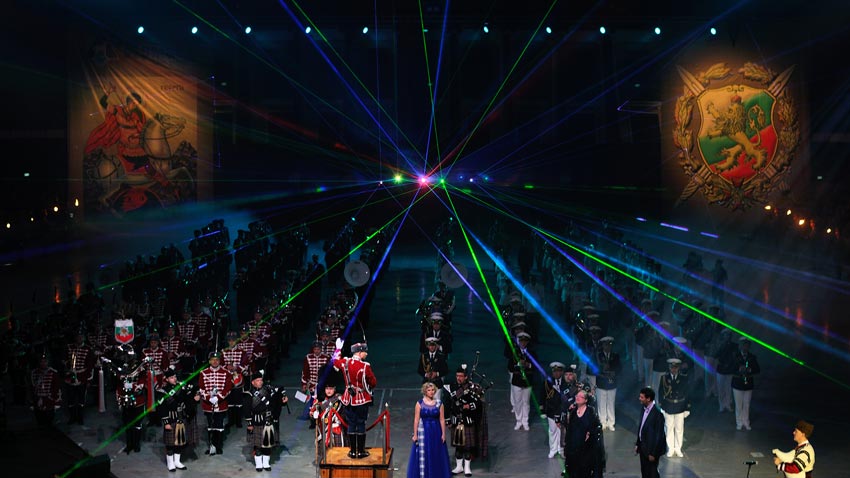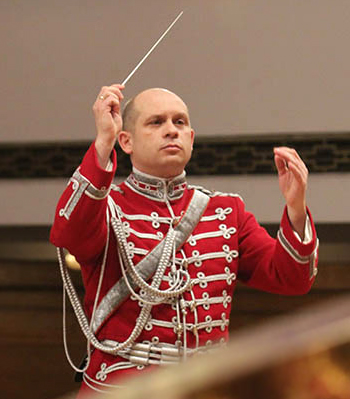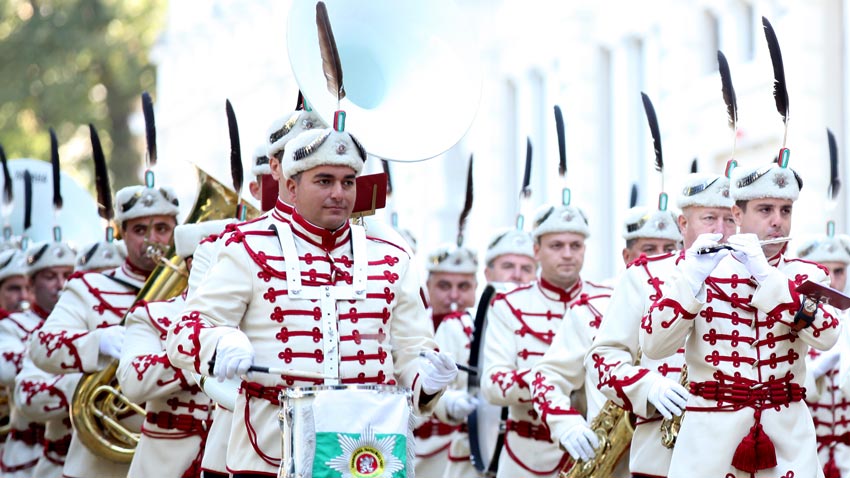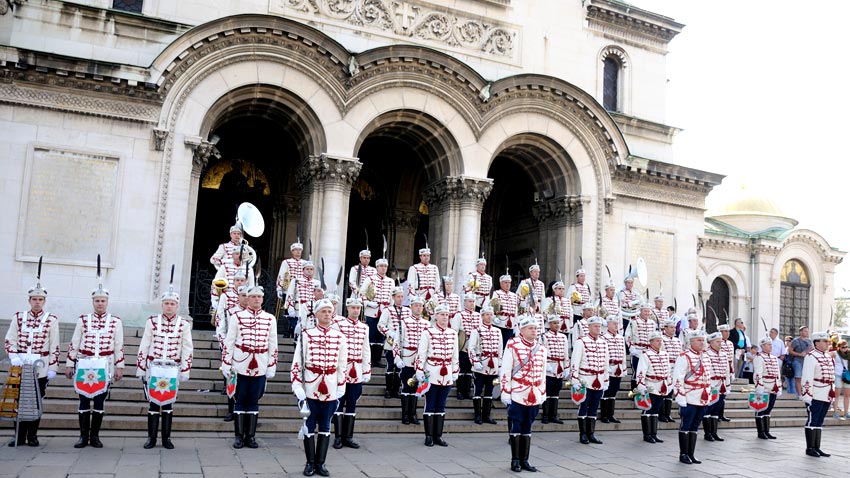In 1890, Alexander of Battenberg decreed that May 6, Gergiovden (St. George Day) be designated Day of Courage and of the Bulgarian army. After an interruption of almost 50 years, in 1993, the holiday was reinstated. It is a date that has special meaning for the musicians from the Bulgarian Guards Brass Band with conductor Major RadiRadev. The band is part of the National Guards Unit and performs all functions connected with protocol. Its traditional 6 May concert is aired live by all channels of Bulgarian National TV.

 “The history of the orchestra is very interesting with all of its reversals of fortuneand the changes it has undergone,” Major Radev says. “Its foundation goes back to the first brass band in Bulgaria created by Czech musicians, 20 in number, commissioned by the Bulgarian government right after the country’s liberation in 1878. They arrived in VelikoTurnovo and on 26 April, organized the first procession in the town’s streets. In 1892 this orchestra was transferred to Sofia and was enlisted as part of the Guards Unit of the Life Guard Cavalry Regiment. Its first conductor was Josef Chochola who was Czech – for a long time all brass band conductors in this country were Czech – with the only exception of Emanuil Manolov, who was to become bandmaster in Plovdiv in 1895. The first Bulgarian to have been appointed bandmaster of the Guards Brass Band was Maestro Georgi Atanasov, author of the first Bulgarian symphony. It is thanks to him that Bulgarian names began to emerge among army music conductors. Most of them graduated in Western Europe – Germany, Austria, the Czech Republic. There was a symphony orchestra that was part of the band and in 1936 it was decided to make it an independent entity. That was how, in 1937, the Sofia Philharmonic came into being. To sum up, the military brass bands were the first professional orchestras in the country performing works by the first Bulgarian composers. When the Union of Bulgarian Composers was set up, it was again army conductors that were the organizing force. With their knowledge and their competence, they were among the men who created professional music education in Bulgaria.”
“The history of the orchestra is very interesting with all of its reversals of fortuneand the changes it has undergone,” Major Radev says. “Its foundation goes back to the first brass band in Bulgaria created by Czech musicians, 20 in number, commissioned by the Bulgarian government right after the country’s liberation in 1878. They arrived in VelikoTurnovo and on 26 April, organized the first procession in the town’s streets. In 1892 this orchestra was transferred to Sofia and was enlisted as part of the Guards Unit of the Life Guard Cavalry Regiment. Its first conductor was Josef Chochola who was Czech – for a long time all brass band conductors in this country were Czech – with the only exception of Emanuil Manolov, who was to become bandmaster in Plovdiv in 1895. The first Bulgarian to have been appointed bandmaster of the Guards Brass Band was Maestro Georgi Atanasov, author of the first Bulgarian symphony. It is thanks to him that Bulgarian names began to emerge among army music conductors. Most of them graduated in Western Europe – Germany, Austria, the Czech Republic. There was a symphony orchestra that was part of the band and in 1936 it was decided to make it an independent entity. That was how, in 1937, the Sofia Philharmonic came into being. To sum up, the military brass bands were the first professional orchestras in the country performing works by the first Bulgarian composers. When the Union of Bulgarian Composers was set up, it was again army conductors that were the organizing force. With their knowledge and their competence, they were among the men who created professional music education in Bulgaria.”
 “In 1944, after the communist coup, the Guards Brass Band was cut down and the remaining musicians were sent to the town of Breznik. At the time its conductor was Nikola Tsonev–an emblematic name in Bulgarian music who graduated in Germany. Nikola Tsonev is one of the top orchestrators of this very specific kind of music. In 1951 the new Central Brass Band of the Bulgarian People’s Army was founded in Sofia, incorporating the younger members of the previous band. For a long time they wore ordinary uniforms instead of uniforms of the guards. Since 2001 the orchestra has had the status and the name it still carries. Notwithstanding all of these changes, it has always performed the same functions, connected with state protocol. And it has always been the symbol of the Bulgarian army, but also of our music culture. In recent years, guards musicians have toured extensively. We are welcomed regularly in Germany, where audiences appreciate our music. In 2009 we were invited to St. Petersburg, we performed for the Bulgarian Jewish community in Israel etc.”
“In 1944, after the communist coup, the Guards Brass Band was cut down and the remaining musicians were sent to the town of Breznik. At the time its conductor was Nikola Tsonev–an emblematic name in Bulgarian music who graduated in Germany. Nikola Tsonev is one of the top orchestrators of this very specific kind of music. In 1951 the new Central Brass Band of the Bulgarian People’s Army was founded in Sofia, incorporating the younger members of the previous band. For a long time they wore ordinary uniforms instead of uniforms of the guards. Since 2001 the orchestra has had the status and the name it still carries. Notwithstanding all of these changes, it has always performed the same functions, connected with state protocol. And it has always been the symbol of the Bulgarian army, but also of our music culture. In recent years, guards musicians have toured extensively. We are welcomed regularly in Germany, where audiences appreciate our music. In 2009 we were invited to St. Petersburg, we performed for the Bulgarian Jewish community in Israel etc.”
What kind of music is performed on 6 May?
“There is a rigorous military orchestra repertoire for 6 May. The marches performed are connected with Bulgaria’s military history, some were written during the Balkan wars, World War I and World War II. Happy in battle, Our soldiers are Great, Bdintsi, We shall be victorious – these are all parade marches with lyrics that offer an insight into the spiritual makeup of Bulgarian soldiers. There are some remarkable stories connected with their creation. For example – when the Botev days were celebrated in Vratsa for the first time in 1920, bandmaster Georgi Bezlov was ordered to write a march for this festive occasion. He refused, saying that music cannot be created on anyone’s orders for which he was given five days of solitary confinement in which to comply. Another story is an illustration that good music knows no bounds – the creation of the march Troyantsi. The story goes back to the Battle of Doiran in 1917 during World War I. Kamen Lukov, the most proliferous Bulgarian composer of brass music, took part in the war as bandmaster of the 34th infantry regiment of Troyan. That was when he composed his march and when the band started played it the enemy suddenly ceased fire. On the next day they played Troyantsi again with the same effect. And the British and French dispatched envoys to ask for the sheet music. They were given the musical score – a mark of true appreciation for the Bulgarian schoolof music. The orchestra I am head of plays works of all genres – classics, jazz, rock. In recent years we have had joint projects with the BNR’s Children’s Radio Choir, with the singers Edelina Kuneva, Orlin Goranov, Margarita Hranova, Orlin Pavlov, Vassil Petrov. On the occasion of the Day of Courage and of the Bulgarian army, May 6 I would like to salute all army men and women, as well as all of our colleagues – the army musicians from all over the country.”

English version: Milena Daynova
Photos: armymedia.bg and archive"More slowly, take it easy" ... sings Stefan Valdobrev, and this refrain has been repeated by Bulgarians in the country and abroad for several years in the hope of reducing the speed at which we turn the arrows of our daily lives... Stefan..
"Christmas Hymn" is among the newest Bulgarian songs dedicated to the Christmas holidays. It is performed by Georgi Kostadinov together with the young singers from the Diamond vocal group. The idea came to its author, Rafi Zhamakortsyan, a year ago,..
Christmas is a very special holiday for Bulgarian pop singer Rumiana Kotseva . For years in a row, she gathers her family and friends in her home - cherished moments that warm her days until next Christmas. This year, the pop singer gave an emotional..
The Sofia Free Jazz Festival will be inaugurated today by two legendary musicians of experimental music and unconventional jazz - Frank Gratkowski..
We start the day with a dose of magic, brought to us by singer, flutist and saxophone player Kristina Dimitrova-Manasieva, also known as KristinSax...
The angelic-voiced Vanya Kostova is no longer with us, but her music is here and it is still strong, sincere and alive. Vanya's son -..

+359 2 9336 661
